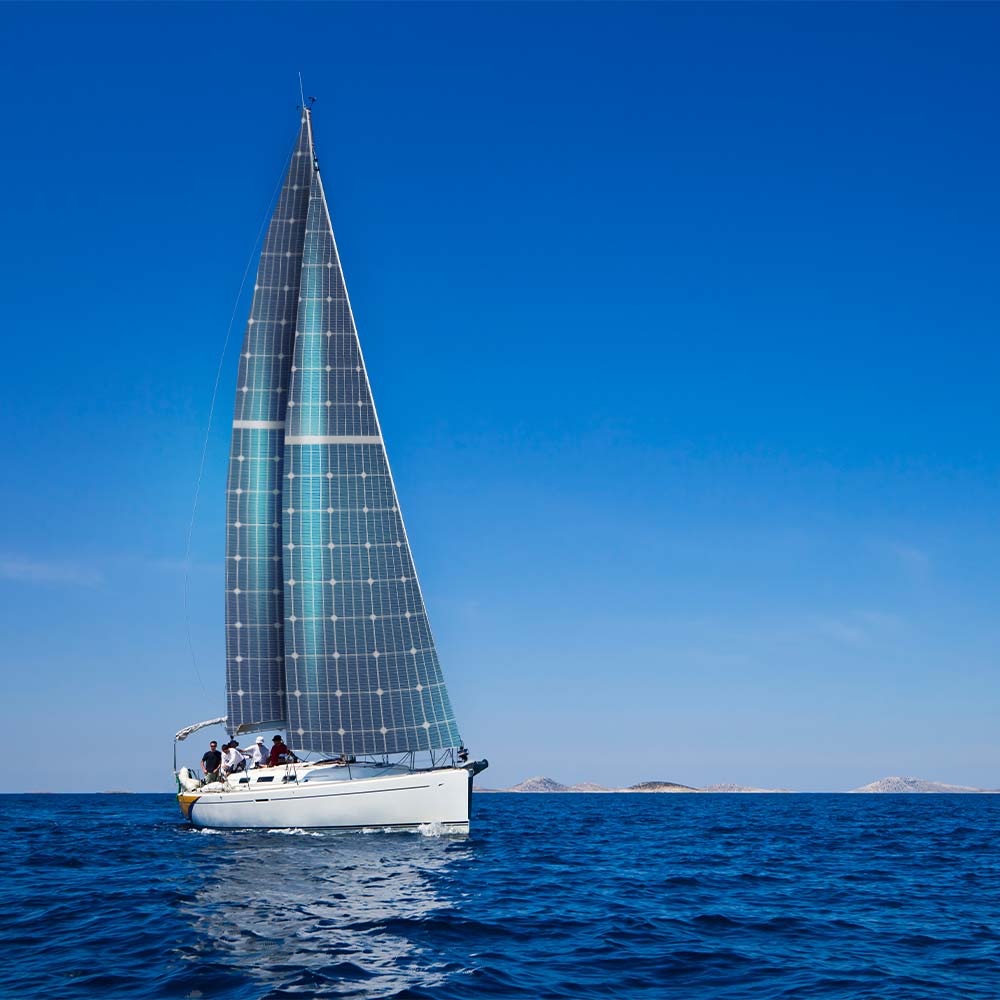-
Next-Gen Solar Panels Will Be More Efficient, Ultra-Thin and Printable
Solar ship sails or tents are some of the applications of these ultra-thin and unprecedentedly efficient photovoltaic panels.
Wind power and photovoltaics are, for the moment, the most efficient and well-established renewables. Both have made significant technological advances on the road to green power in the last decade. While wind energy has looked to the sea to increase its production capacity, solar panels have opted to improve the photosensitive layer. Today, it is not uncommon for solar panels to exceed 20% energy efficiency. MIT has just given it another twist and, in addition to achieving unprecedented efficiency, its new photovoltaic panels will be ultra-thin and able to adhere to almost any surface.
This article covers the following topics:
- The new generation of ultra-thin, printable solar panels
- The keys to its high energy efficiency
- Innovative applications of photovoltaic panels
Ultra-thin printable solar panels
Photovoltaic cells are pretty fragile. They must therefore be protected with glass and embedded in robust metal structures. MIT, specifically its ONE Lab, has been studying new approaches for years to solve this problem. For example, in 2017, they presented a thin photovoltaic film that could be placed on a soap bubble. Unfortunately, this was a prototype with no industrial scalability. The silver lining is that it helped them advance the development of the photovoltaic inks they have just presented.
The new printable panels weigh a hundred times less than current ones and offer eighteen times greater efficiency per kilogram of weight. The secret lies in using nanomaterials that form the basis of the ink, which is printed on a peel-off film just fifteen microns thick. Subsequently, a basic screen printing technique – as used in T-shirt manufacturing - is used to apply a substrate to the film on which the photovoltaic ink is then fixed. The process is relatively simple and, above all, industrially scalable, which is a boost for the future of renewable energies.

A photovoltaic technology of unprecedented efficiency
In their tests, the ONE Lab experts have established that their new printable photovoltaic technology offers an efficiency of up to 370 watts per kilogram.
The researchers give the example of a rooftop solar installation weighing up to half a ton. If the new photovoltaic film were applied, the weight of the structure would be reduced to barely fifty pounds, although it is likely that a larger surface area would be required.
The new technique, speaking of surfaces, involves the possibility of applying the ultralight material to virtually any material, including fabrics, plastics, or metals. Best of all, in laboratory experiments, it was possible to roll and unroll the film up to five hundred times while maintaining 90% of its ability to produce electricity.
In addition to photovoltaic facades, these are some of the potential applications of the new printable technology:
- Ship sails with a photovoltaic film
- Electricity-generating tents
- Photovoltaic clothing and wearables
- Photovoltaic drone wings for increased autonomy
- Electric vehicles with lower recharging requirements
Once the technology's energy efficiency has been demonstrated, the challenge is to produce a plastic sheet that protects the nanomaterials from the elements to increase their durability. Below you can see a video from MIT on the development of the new printable photovoltaic panels and the underlying technology:
The infinite possibilities of photovoltaic panels
Today there are plenty of ways to install photovoltaic cells to advance the transition to a more sustainable economy. These are some of the more curious ones we have discussed in recent times:
- Photovoltaic films for façades. In line with the MIT invention, this innovative technology consists of a polymer-based organic film just one millimeter thick. With a single gram of the new compound, up to one square meter of surface can be coated.
- Photovoltaic glass. As we saw in this article, photovoltaic glass can be a great ally in urban environments where glazed skyscrapers are the norm. In addition, they can be used to filter harmful ultraviolet radiation.
- Hybrid wind farms. Wind turbines require a primary power supply for their operation. In this wind farm, a hybrid model has been chosen, with organic photovoltaic panels installed around the wind turbine towers.
- Solar houses. Inspired by sunflowers, this proposed house takes a step beyond solar-paneled roofs and embraces a rotating structure that follows the sun's movement throughout the day to maximize efficiency.
If you want to learn more about the future of renewable energies, do not hesitate to subscribe to our newsletter at the bottom of this page.
Source:
Write your comment
All fields are mandatory.
Thank you for your comment
More about Energy
Featured topics
Read the most discussed articles

{{CommentsCount}} Comments
Currently no one has commented on the news.
Be the first to leave a comment.
{{firstLevelComment.Name}}
{{firstLevelComment.DaysAgo}} days ago
{{firstLevelComment.Text}}
Answer{{secondLevelComment.Name}}
{{secondLevelComment.DaysAgo}} days ago
{{secondLevelComment.Text}}